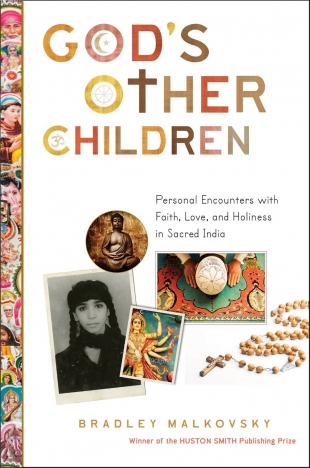Bradley Malkovsky is associate professor of comparative theology at the University of Notre Dame. He has degrees from the University of Tubingen, Germany, and has studied Sanskrit and Hindu thought at the University of Poona in Pune, India. He is the editor of the Journal of Hindu-Christian Studies and winner of the Huston Smith Publishing Prize. God's Other Children is a spiritual adventure story that illustrates the freedom and fulfillment that can be discovered in encounters with other religions and their practices.
Not having his spiritual yearnings dealt with at home during his adolescence, the author converted to Catholicism and worked as a volunteer at a soup kitchen. He then spent 11 months in a New Mexico monastery as a long-term guest. After two years of attending Saint John's University in Minnesota, he went to Germany and wound up studying theology for eight years with professors who were ecumenically-minded. By age 31, Bradford Malkovsky had completed 13 years of wandering in America and Germany.
Next stop was India. Prior to arriving in the country, Malkovsky had practiced hatha yoga and meditation. But nothing prepared him for the cumulative encounters with Islam, Hinduism, and Buddhism which would give his life a deeper purpose and direction. After being healed of a serious stomach ailment, the American is treated by a local Ayurvedic doctor who impresses him with his knowledge of the body.
Two spiritual teachers have a deep impact on Malkovsky. He practices vipasanna on a retreat with Satya Narayn Goenkaji and is grateful for the spiritual lessons that come from this Buddhist practice of purifying the mind and being compassionate towards others. He also meets Father Bede Griffiths and is taken with his "spiritual presence, his humility and gentleness, the quality of his homilies at Mass, and his capacity to inspire a high level of spiritual conversation among the ashram guests." Afterwards the author understands more than ever before the need for Christians to open themselves to what God is teaching them through other religions.
Best of all, the author falls in love with Mariam, a young woman who was raised in the Muslim faith. Malkovsky's spiritual adventures continue with the raising of a stone at a Muslim shrine, an account of his secret wedding, and a look at a funeral. Like Diana Eck who wrote about her India travels in Encountering God: A Spiritual Journey from Bozman to Banaras, the author finds that his faith in Jesus is deepened as a result of his experiences in India with Islam, Hinduism, and Buddhism. He sees Jesus as both with and beyond the religions: a Jew who proclaims "a people come first religion."
In the stirring epilogue, Malkovsky sums up the things he's learned to value in Islam, Hinduism, and Buddhism. And then, in conclusion, he notes: "My hope remains that my various accounts of the goodness and holiness found within other religions will inspire Christians to explore these religions themselves to see how enriching they can be."
